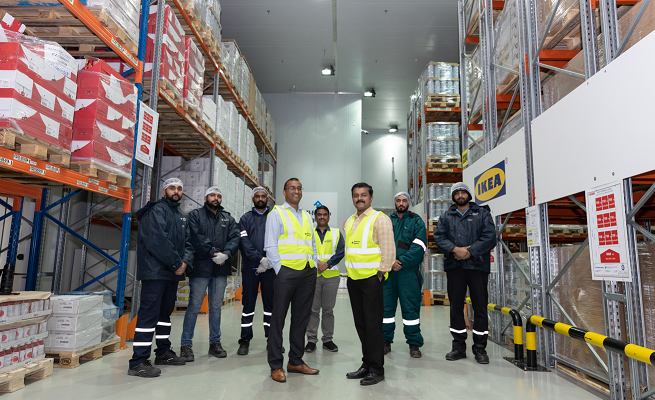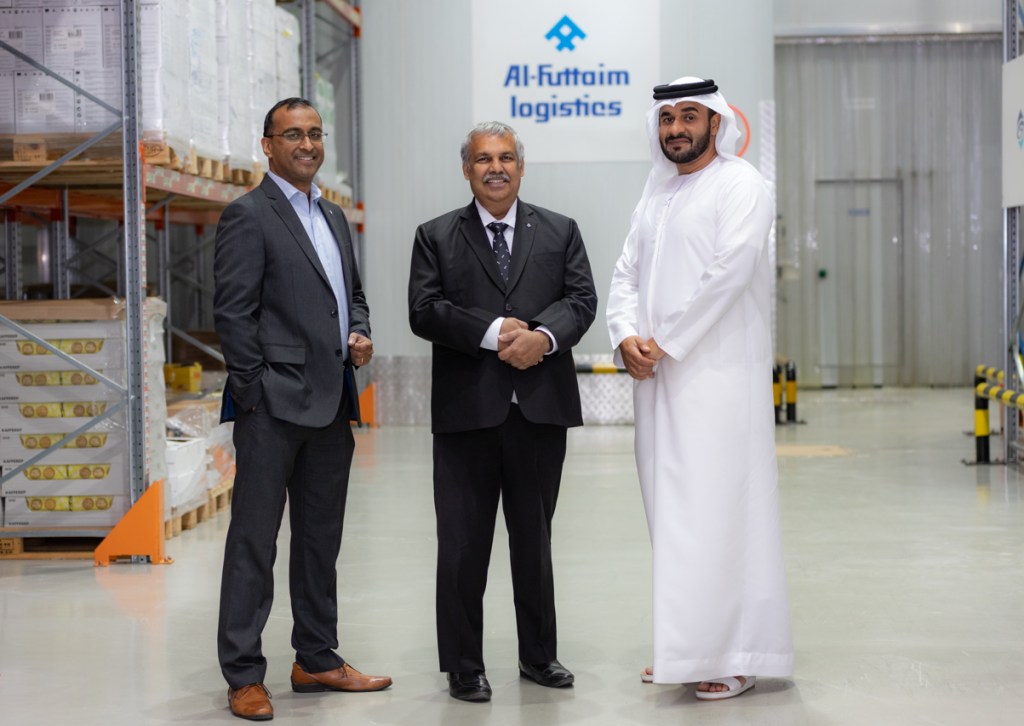Kasun Illankoon explores in detail Al-Futtaim Logistics’ award-winning Cold Chain Warehouse Facilities that caters to the F&B Industry.
Since Al-Futtaim Logistics’ inception in 1980, it has grown from strength to strength and has achieved several milestones. The company has accolades due to the introduction of innovative technologies, new service offerings such as the cold store for food & beverages, recovery, pick and drop automotive services and last mile delivery (B2C). The growth of Al-Futtaim Logistics as a integrated third party logistics provider (3PL) over the past four decades was built on three key pillars according Dr. Raman Kumar, Managing Director at Al-Futtaim Logistics, who in the past 26 years, has overseen one million sqm of infrastructure development, and delivering services to multinational blue-chip companies. “Initially, we had three main criteria that we wanted to achieve which included operational efficiency, increasing our customer satisfaction, and increasing employee engagement. Once we managed to achieve this, we looked at our business expansion and what additional value we can give to our customers.

The on-going pandemic didn’t seem to deter Al-Futtaim Logistics when it came to their business operations. Quick and adaptable changes were necessary, and this was at the forefront of the company’s plans. “At Al-Futtaim Logistics we had a strong business continuity plan in place which allowed us to manage the crisis.” Kumar added: “The biggest challenge we saw was the mindset of our customers especially when it came to delivery services and the steps that would need to be taken to ensure that everyone was safe. We had to implement a new HSE strategy and follow strict protocols to ensure that everyone would be protected during our services.”

Vargheese Anthony, General Manager, Freight-Forwarding at Al-Futtaim Logistics, further added to some of the challenges faced during the initial part of the pandemic. “In the freight market stakeholders such as shipping carriers ports, road and rail transport, customers warehouses had some sort of a stoppage or limited services and accesses from the beginning to the last mile stage of the delivery process. The limited access and absence of timely services of stakeholders that created unprecedented delays in the total supply chain.”
However, Vargheese highlighted that UAE being a strategic hub and it’s infrastructure facilities helped facilitate business continuity much quicker than most of the world. “During the last four decades the UAE has been transformed as a leading hub due to the facilities, infrastructure, and government policies that are pro-business here in the UAE. Ultimately the world connects through the UAE due to its strategic position in the trade, this allows companies like us to continue to provide the necessary services even during these hard times.”
COLD CHAIN SERVICES
Al-Futtaim Logistics recently expanded into food and beverage logistics services earlier this year, opening their state-of-the-art, tech-friendly, and innovative cold storage warehousing facility located in Jebel Ali Free Zone. The announcement came as the company scales up its end-to-end fulfilment services to meet the needs of eCommerce and marketplace clients with all-inclusive last-mile home delivery solutions.
According to analysis done by Dubai Chamber of Commerce and Industry & Euromonitor, online sales within the UAE’s food and beverage market surged 255% year-over-year in 2020 to reach $412 million. The analysis predicted the value of online food and beverage sales in the country to reach $619 million by 2025 and record a compound annual growth (CAGR) of 8.5% over the 2020- 2025 period. Al-Futtaim Logistics made an immediate impact with their expanded services and was awarded the Cold Chain Service Provider at the recent Logistics & Transport Awards 2021. Kumar on the awards win, said: “Moving and storing temperature-sensitive packaged food and beverages requires continuous commitment and dedication to the highest quality standards. Our operational precision maximises the replenishments for our clients, whilst optimising their supply chain cost effectiveness, which has become even more important to our customers in today’s market conditions. Thanks to our associates, loyal customers and the management team for their continued support.”
WAREHOUSE FACILITY
The facility integrates world-class warehouse management technology including capturing all the attributes of the products combined with double-deep storage that optimises space utilisation and enables high throughput. The multi-temperature facility ranging from +18°C to -22°C has scalable space for the growing needs of their customers. Binoy George, General Manager, Warehousing, and Last Mile distribution at Al-Futtaim Logistics shed some light on the features of the cold storage warehouse facility. “The facility is built with airlocked loading docks, and the temperatures are mapped throughout the facility to ensure that the temperature integrity is being maintained. In today’s dynamic environment we can offer our customers multi-temperature fulfilment from chilled, ambient to frozen. The product storage can range from fresh food, confectionery, beverages, deep-frozen products with the added advantage of being flexible with multiple fulfilment options.”

The cold store has been designed for individual piece-pick and pallet picking, value-added services such as product regulatory compliances, date coding, Arabic labelling to cater to the ‘speed-to-market’ orders. The facility also offers a dedicated onsite inspection for local authority thereby fast-tracking food sample inspections considering compliances with stringent municipality standards, including the ISO Food Safety Management practices. “Our customers get the advantage of real time visibility, seamless system integration, inventory data in real time and in some cases instant retrieval of data,” explained Binoy.
TEMPERATURE-CONTROLLED FACILITY
The temperature within the facility itself is one of the most important to maintain when it comes to F&B products. A slight change in temperature would dull the freshness of the products and Binoy stresses the importance of keeping the temperature consistent from the warehouse to the end consumer. “One of the most critical features and challenges is maintaining the temperature across the whole chain. The chain has multiple touch points right from the product of origin with right packaging and static temperature to be moved into the transport unit which also needs to be at the right temperature moving it into the destination port, first-mile and into the temperature-controlled storage facilities.”
“The facility will have temperature mapping across our multi-temperatures storages that is monitored 24/7 with a leading technology partner. If there is a temperature variation beyond the deviation limits that has been set then an alert is sent out to the response team who needs to take immediate corrective action,” added Binoy.
There are environmental impacts too to be taken into consideration which is why the facility has an airlocked loading bays to prevents any environmental impacts or foreign material from affecting the storage.
“Even a small detail like a fast-action door getting jammed affects the temperature, so every detail needs to be looked into to ensure the temperature is maintained,” said Binoy. Al-Futtaim Logistics’ entire chain is built around a process which requires validation and check points that minimise risks and to take quick action in case there is a temperature deviation. All Al-Futtaim fleet is fitted with vehicle monitoring technology to ensure supreme temperature integrity for the consumers. Out of the box solutions also include local services for customers who require product registration and documentation services, making it easy to avail all the services from a single 3PL.
The importance of digitisation and data collection is seen as a critical component in Al-Futtaim Logistics and something that Kumar wants to see more of in their operations especially when it comes to integrating their services.
“We have a yard management, transportation management, and warehouse management technologies which all operate as separate entities within Al-Futtaim Logistics. I want to integrate this and use our digital platform to allow the customer to easily observe their order and allow for more transparency,” said Kumar.

Binoy echoed this sentiment as well particularly in last mile delivery, “We see that the digitisation of fulfilment centres will be the next area of focus. At Al-Futtaim Logistics we are trying to see how to automate our processes that will help to reduce repetitive tasks, and how we can move information from one system to another with efficient integration. We are working to see how we can do inventory counts with multiple cycle counts in the fulfilment centre, using drone and RFID technology. The ultimate goal will be how quickly we can move through the chain to get the product to our end consumer.”
When it comes to F&B, the market segment has high demand and depending on the type of product, where on-time fulfilment can be an important competitive advantage to have.
“Today, we see those customers with premium products with shorter shelf-life and quicker turnaround to the retailers or direct consumer. Having this data is critical for us to make a proper assessment of what needs to be dispatched in a timely manner and make the necessary changes to our chain,” explained Binoy.
Kumar emphasised how data retrieved by their team assisted them in making necessary changes to their warehouse management.
“We are able to analyse our warehouse configuration for example. The fastmoving goods are now placed in a better position for efficiency and for pick up as customers in this segment now want same day delivery. Even though technology will change the way we operate, we believe that our workers too will adapt to this new technology as it doesn’t just enable the business to improve but allows the customers the opportunity to see a smooth flow of their products being moved from one place to another,” said Kumar.
Overall, Al-Futtaim Logistics’ momentum and adaptability to changing consumer preferences in the F&B logistics sector has ensured sustainable growth and expansion of services from UAE, to KSA and Oman.

